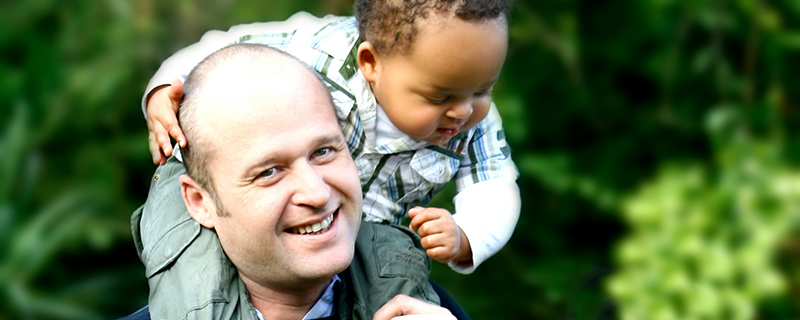
Adopting a child of another race can be very rewarding for many families, yet this decision brings with it unique challenges. Transracial adoptive families most likely have faced questions from complete strangers. Society’s persistent race-based stereotypes will likely impact these adopted persons in ways that well-intended parents may not have personally experienced or even anticipated.
I realized I never could change my ethnicity/race. I also developed a pride in being Korean and Asian. I reviewed things I liked about being Asian that European Americans did not have. I also grew comfortable with things I did not like about being Asian. As an adult I learned how to deal with racism/stereotypes in a way that makes me feel OK about being a “border person” and a minority.
(Study respondent)
Transracial adoption is a reality of contemporary American life. Since 1971, parents in this country have adopted nearly a half-million children from other countries, the vast majority of them from orphanages throughout Asia, South America and, most recently, Africa. Additionally, tens of thousands of multiracial families have been formed during this period, with boys and girls adopted from foster care. The rate of such adoptions from the domestic system grew from 10.8 percent in fiscal year 1995, when there were about 20,000 total adoptions, to 15 percent in 2001, when there were over 50,000. In the vast majority of these cases –domestic and international– children of color have been adopted by Caucasian parents.
The consequences of this historic phenomenon have been profound, both for the tens of millions of Americans into whose families these children have been adopted, and for a society in which our understanding of what a family looks like is being altered every day. Yet we know very little about the impact of this change – most pointedly about its effects on the Asian, Hispanic and African-American boys and girls at the core of it. How do they develop a sense of racial identity when raised by white parents, most often in predominately white communities? How do they incorporate an understanding both of being adopted and of having parents who are of a different race or ethnicity than themselves? How do they learn to cope with racism and stereotyping? What experiences are beneficial to them in developing a positive sense of self? In a ground-breaking study conducted by the Evan B. Donaldson Adoption Institute, Beyond Culture Camp: Promoting Healthy Identity in Adoption, the Institute explores these questions and more and shares its findings and recommendations.
Learn More
Featured Reading
Inside Transracial Adoption
 Gail Steinberg and Beth Hall, 2012
Gail Steinberg and Beth Hall, 2012
This book provides creative, confident and pro-active guidance on how to build close, loving, and very real families consisting of individuals who are proud and culturally competent members of differing races. Drawing on research and personal experience, Steinberg and Hall offer detailed, step-by-step, get-real guidance for families about tough issues they have to face relating to race and adoption in domestic or international transracial adoptions: What’s “normal”? Where do we live and go to school? Does class have an influence? How do children develop racial identity? What kind of impact does being raised by white parents have on a black child? Combining humor with empathy and hard truths, this book is an established classic guide to living Inside Transracial Adoption.
Online Learning
Beyond Culture Camp: A Guide for Professionals
Webinar offered by Adoption Learning Partners
In a first-of-its-kind study, Beyond Culture Camp: Promoting Healthy Identity Formation in Adoption, more than 450 adult adoptees were surveyed to better understand the complex and inter-related impacts of being adopted and being raised by parents of a different ethnicity. Adam Pertman, Executive Director of the Donaldson Adoption Institute, will review key findings from the study. Practical recommendations for adoptive families on how to promote a healthy sense of self will be shared.
Conspicuous Families
Course offered by Adoption Learning Partners
Adopting a child of a different race or ethnicity presents challenges families may not expect. Share in the wisdom and collective experiences of adopted persons and adoptive parents with transracial families and learn new skills for responding to insensitive comments as well as strategies for expanding the diversity in your life.
Articles and Websites
Beyond Culture Camp: Promoting Healthy Identity in Adoption
Evan B. Donaldson Institute, November 2009
Empowering Adopted Children of Color in the Face of Racism and Discrimination
Pepperdine Graduate School of Education and Psychology, October 2017
Race and Identity in Transracial Adoption: Suggestions for Adoptive Parents
Adoption Advocate No. 38, National Council for Adoption, August 2011
Seven Tasks for Parents: Developing Positive Racial Identity
North American Council on Adoptable Children; Article written by Dr. Joseph Crumbley.
Talking About Race and Racism
Adoptive Families, June 2015; Article written by Joemy Ito-Gates and Wei Ming Dariotis
Transracial Parenting in Foster Care and Adoption
Iowa Foster and Adoptive Parents Association
Provides tips for parents and children in transracial homes to help them thrive, celebrate their bicultural family, and for children to strengthen racial identity and cultural connections.
Please note: The Adoption Assistance Program (AAP) does not promote or endorse any websites, organizations or individuals that may be linked from this site. The AAP does not guarantee the accuracy of the information or the appropriateness of advice for a particular situation. It is our intent to assist users in their search for reliable and useful sources of information pertaining to adoption, legal guardianship, and parenting.